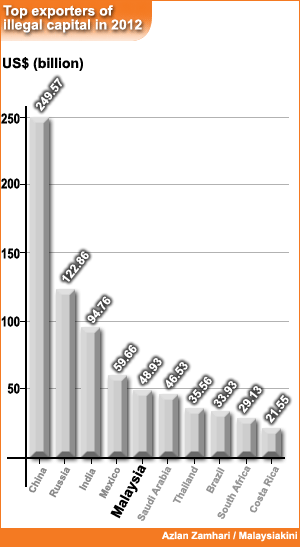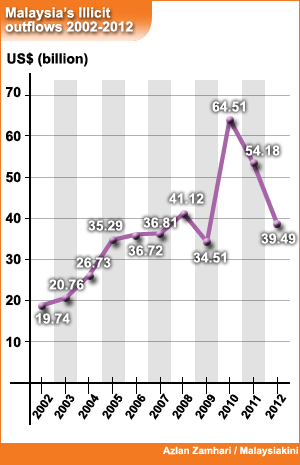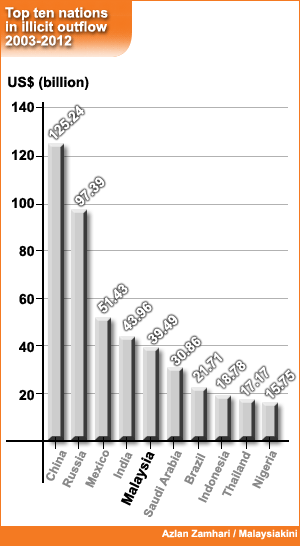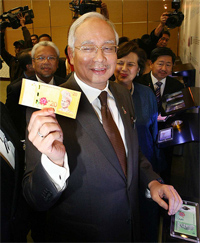The price tag of the KL International Airport 2 (KLIA2), which sky-rocketed almost three-fold to RM4 billion, may have outraged taxpayers but it dwarfs the illicit outflow of money suffered by Malaysia in one year alone, which is enough to build the over-budgeted airport 42 times over.
According to the latest annual report by Washington-based Global Financial Integrity (GFI), Malaysia lost a total of RM171.11 billion (US$48.93 billion) in 2012 - the latest statistics revealed by the watchdog in almost a decade of tracking illegal capital flight.
The report, released today, said Malaysia had lost an accumulated amount of RM1.38 trillion (US$394.87 billion) since 2003.
 The sum is enough to fund Malaysia's budget for five consecutive years, based on the RM273.9 billion allocated under Budget 2015.
The sum is enough to fund Malaysia's budget for five consecutive years, based on the RM273.9 billion allocated under Budget 2015.
According to the global financial watchdog, the illicit outflows were lost in the form of corruption, tax evasion and crime.
Despite the damning capital flight, Malaysia showed a marginal improvement, with the illicit outflows for 2012 declining by 5.98 percent compared with 2011.
Malaysia's illicit outflows ranged between RM70 billion (U$20 billion) and RM140 billion (US$40 billion) annually since 2003, but spiked dramatically to RM218.06 billion (US$62.45 billion) in 2010.
However, the annual figure had been on a downward trend since then, declining to RM181.19 billion (US$52.05 billion) in 2011 and RM171.11 billion (US$48.93 billion) in 2012.
World’s No 5 in illicit outflows
In the latest report, Malaysia remains among the top five countries for illegal capital flight but its ranking improved slightly.
The country was ranked the second worst in terms of illicit outflow in 2010 but gradually “improved” to fourth place in 2011 and fifth place in 2012.
 For 2012, which is the latest statistics, tiny Malaysia is ranked behind China, Russia, India and Mexico.
For 2012, which is the latest statistics, tiny Malaysia is ranked behind China, Russia, India and Mexico.
The report, titled ‘Illicit Financial Flows from Developing Countries: 2003-2012', says 77.8 percent of all illicit outflows are from mis-invoicing of trade transactions.
In March last year, Bank Negara Malaysia (BNM) acknowledged the problem of illicit outflows from Malaysia, but claimed that the figures by GFI were overstated .
BNM had said GFI did not take into account Malaysia's trade through re-export hubs like Singapore and Hong Kong which would have reduced the invoice mis-pricing estimate.
The report, since last year, had factored in re-exporting via Hong Kong but could not do so for re-exporting via Singapore as the statistics is not made public by the city state.
GFI chief economist Dev Kar had said adjustment factoring Singapore was less significant than Hong Kong as the latter was a much larger entrepot hub compared with Singapore.
However, Minister in the Prime Minister's Department Paul Low argued that Malaysia is a bigger trade partner with Singapore.
Trade misinvoicing is the intentional misstating by multinational companies of the value, quantity, or composition of goods on Customs declaration forms and invoices, usually for tax evasion.
'Extremely conservative' estimates
In the most recent report, GFI said its methodology remains "extremely conservative" as it does not include trade mis-invoicing in services, same-invoice trade misinvoicing, ‘hawala’ transactions and dealings conducted in bulk cash.
 “This means that many forms of abusive transfer pricing by multinational corporations as well as much of the proceeds of drug trafficking, human smuggling, and other criminal activities, which are often settled in cash, are not included in these estimates," said Kar.
“This means that many forms of abusive transfer pricing by multinational corporations as well as much of the proceeds of drug trafficking, human smuggling, and other criminal activities, which are often settled in cash, are not included in these estimates," said Kar.
‘Hawala’ is an underground banking system based on trust whereby money can be made available internationally without actually moving it or leaving a record of the transaction, and is widely practised by many money changers in Malaysia.
A record of US$991.2 billion in illicit capital flowed out of developing and emerging economies in 2012, the report says.
“Most troubling, however, is the fact that these outflows are growing at an alarming rate of 9.4 percent per year - twice as fast as global gross domestic product,” said GFI president Raymond Baker.
GFI made several recommendations to overcome this problem, including urging governments to establish public registries of meaningful beneficial ownership information on all legal entities.
 It added that financial regulators should also require all banks to know the true beneficial owner or owners of accounts opened with the financial institutions.
It added that financial regulators should also require all banks to know the true beneficial owner or owners of accounts opened with the financial institutions.
GFI also called on governments to implement the Financial Action Task Force’s (FATF) anti-money laundering and to enforce such laws, while tax havens should be treated with the highest level of scrutiny.
"Policymakers should require multinational companies to publicly disclose their revenues, profits, losses, sales, taxes paid, subsidiaries and staff levels on a country-by-country basis," it said.
It also urged the United Nations to set a target to halve illicit outflows by 2030.

